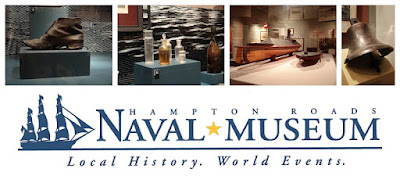"Our Little Monitor":The Greatest Invention of the Civil War
By Anna Gibson Holloway and Jonathan W. White (Kent, Ohio: Kent State University Press, 2018)
Reviewed by Joseph Miechle
Hampton Roads Naval Museum Educator
The most recent addition to the long historiography of the USS Monitor comes from two authors with a history in Hampton Roads. Dr. Anna Gibson Holloway was curator of the USS Monitor Center at the Mariners Museum in Newport News, Virginia. She has also served as the maritime historian for the National Parks Service Maritime Heritage Program in Washington D.C. Dr. Jonathan White is an associate professor of American Studies at Christopher Newport University in Newport News, and he has eight successful books on the American Civil War and President Abraham Lincoln under his belt. He has published more than one hundred articles, essays and reviews, and is the winner of the Abraham Lincoln Institute’s 2015 book prize. A better duo to collaborate about a book on one of the most famous ships to ever serve in the US Navy would be difficult to conceive.

The 283-page book is itself structured with two main parts. Part one, The Monitor in History and Memory, lays out the history of the ship from conception to sinking and even includes a brief section on her most well-known enemy, CSS Virginia. The building of Monitor and the prejudices John Erickson had to overcome to have the Navy accept his ship are well presented. From launching in New York, to the turbulent voyage south to Hampton Roads, to the monumental battle with Virginia, numerous primary sources coupled with the two authors own expertise on the subject present an amazingly compelling narrative. It is not often one is able to describe a work of historical non-fiction as a page turner, but in this instance the shoe certainly fits. The story of one of Americas favorite ships winds down as the authors describe the vessel post Battle of Hampton Roads, and the strenuous conditions on which the crew worked, fought, and lived until the tragic sinking in December, 1862. The authors weave the story using the accounts of crew members as well as those from people “outside looking in.” The reader really walks away with a sense of how the public felt about the Monitor, and why she became so endearing to them, despite a short service life. The last chapter of Part one concludes with the recovery of Monitor’s turret, conservation efforts at The Monitor Center, new findings, and interment of the remains of crewmen who perished when the vessel foundered off the coast of North Carolina.
Part two, A Documentary Record of the USS Monitor, provides us with a substantial number of germane primary resources yet manages not to overwhelm the reader. Of particular interest is a section on letters sent to President Lincoln by citizens who desired to improve Monitor with often absurd modifications, so that the ship might be better equipped to sink her foe, CSS Virginia. Many of the ideas sent to Lincoln also contained diagrams or drawings. Some ideas are very detailed, some could possibly have worked, other are quite comical, many of them are reproduced in this book in full color. Partial deck logs from USS Currituck and letters from Monitor, First Engineer Isaac Newton Jr. round out the less often seen primary sources from Part two.
“Our Little Monitor” would look just as at home with lavishly illustrated coffee table books as it would with other important scholarly volumes. It contains well over a hundred full color, detailed photographs that help really solidify how contemporary observers viewed Ericsson’s Monitor. Nestled amongst the images are lesser known primary accounts of the Battle of Hampton Roads, songs and poems written about the ship and her crew, as well as drawings and paintings that celebrated the “Greatest Invention of the Civil War.” This book will undoubtedly set a standard for Monitor research in the future and should be included in any serious historiography. It ought to be considered a “must” for any serious student of the American Civil War and would be an entertaining read to even those with just a casual interest.



Knowing Anna Hollaway, I already know this book is worth buying and reading. Good for you, Anna! Congratulations!
ReplyDelete-Paul Kellogg